Après des années de création de sites WordPress, nous avons appris à quel point il est important d’avoir une installation locale de WordPress sur votre ordinateur.
Avoir WordPress sur votre machine personnelle vous permet d’expérimenter de nouvelles fonctionnalités sans risquer votre site en direct, de plonger profondément dans le développement de WordPress, et même de construire des sites entiers avant qu’ils ne soient mis en direct. C’est comme si vous aviez un bac à sable privé pour tous vos projets WordPress.
Si vous êtes un utilisateur de Windows, il existe de nombreuses façons d’installer WordPress localement. Mais nous avons réduit la liste aux deux méthodes les plus simples. Dans ce guide, nous vous montrerons comment installer facilement WordPress sur un ordinateur Windows, quelle que soit la version que vous utilisez.
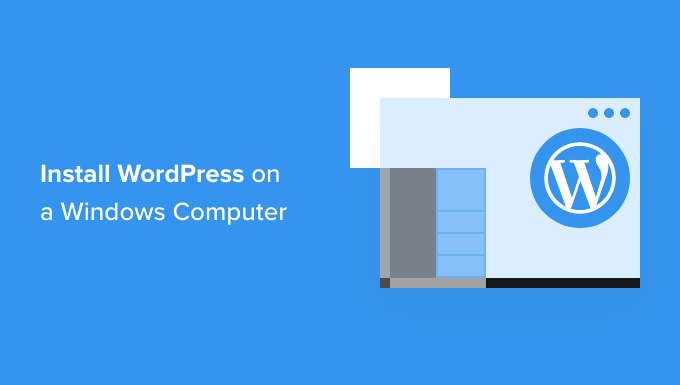
Pourquoi installer WordPress sous Windows ?
Si vous utilisez Windows, l’installation locale de WordPress sur votre ordinateur présente plusieurs avantages.
Une installation locale de WordPress crée un environnement de test qui n’affecte pas votre site direct. Cette installation, souvent appelée serveur local, est votre terrain de jeu personnel pour WordPress.
Les développeurs WordPress utilisent régulièrement des installations locales pour leur travail. Par exemple, ils peuvent s’en servir pour expérimenter de nouvelles extensions ou de nouveaux thèmes, ou pour tester le site avant la mise à jour vers l’éditeur de blocs Gutenberg.
Mais ce n’est pas seulement pour les professionnels. Si vous êtes nouveau sur WordPress, une installation locale est parfaite pour apprendre. Vous pouvez explorer les fonctionnalités, tester les thèmes et les extensions, et expérimenter librement sans craindre de casser un site en direct.
Il est important de noter que lorsque vous installez WordPress localement sous Windows, vous êtes le seul à pouvoir voir le site. Si vous souhaitez créer un site public, vous aurez besoin d’un nom de domaine et d’un hébergement.
Techniquement, il est possible d’installer WordPress sur Windows en utilisant XAMPP, et nous avons déjà écrit un tutoriel à ce sujet.
Cela dit, nous avons trouvé deux méthodes encore plus simples que XAMPP pour mettre en place un environnement WordPress local, ce qui les rend parfaites pour les débutants ou les utilisateurs qui ont besoin de créer un site local rapidement. Vous pouvez cliquer sur le lien ci-dessous pour passer à la méthode qui vous intéresse :
Méthode 1 : Installer WordPress sur Windows à l’aide de Studio (rapide et simple)
Pour la première méthode, nous utiliserons Studio. Il s’agit d’un logiciel WordPress local conçu par Automattic, la société qui gère et exploite WordPress.com, qui est un constructeur de sites web basé sur le logiciel WordPress.
Nous parlerons d’abord de cette méthode parce qu’elle est beaucoup plus rapide et plus simple à suivre, ce qui la rend idéale pour les débutants complets.
Tout d’abord, vous devez ouvrir le site Studio by WordPress.com. Ensuite, cliquez sur le bouton “Télécharger pour Windows”.
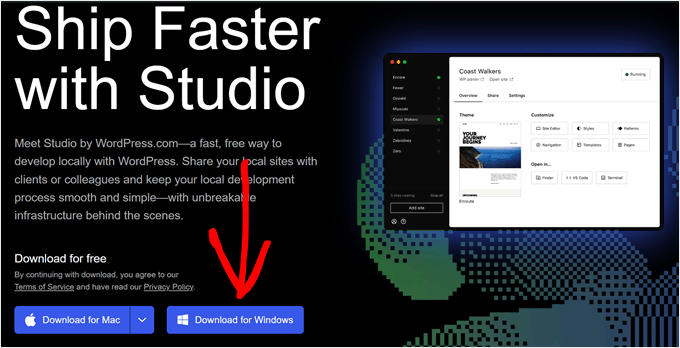
Une fois cela fait, il suffit d’ouvrir le fichier téléchargé pour lancer l’installation.
Une fenêtre contextuelle apparaît alors, vous indiquant que l’application est en cours d’installation.
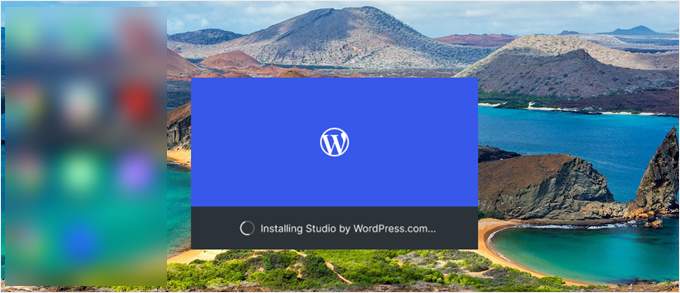
Ceci fait, vous pouvez ajouter votre premier site.
Pour ce faire, il vous suffit de saisir le nom de votre nouveau site WordPress local et de cliquer sur “Ajouter un site”. Vous pouvez nommer le site comme vous le souhaitez, tant qu’il vous permet de l’identifier facilement.
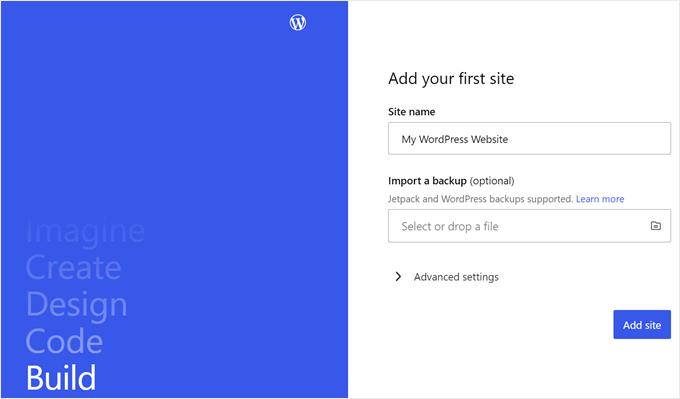
Vous devriez maintenant voir le tableau de bord de votre site WordPress local.
Pour accéder à votre tableau de bord WordPress et modifier votre site, il vous suffit de cliquer sur le bouton ” Démarrer ” en haut à droite. Vous pourrez ainsi accéder à votre site local sur votre ordinateur.
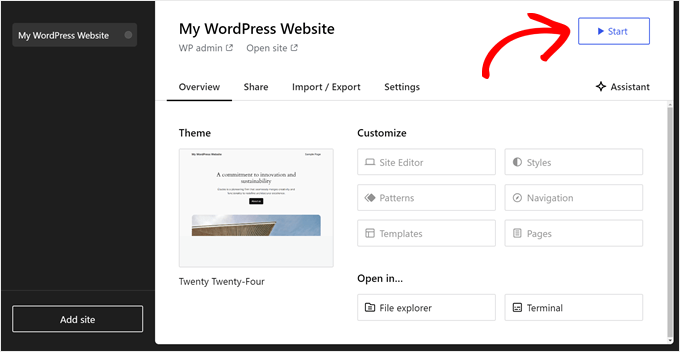
Une fois que le bouton “Start” est modifié en “Running”, vous pouvez cliquer sur le lien “WP Admin” en haut à gauche de la page.
Cela vous amènera à la page d’administration locale de WordPress.
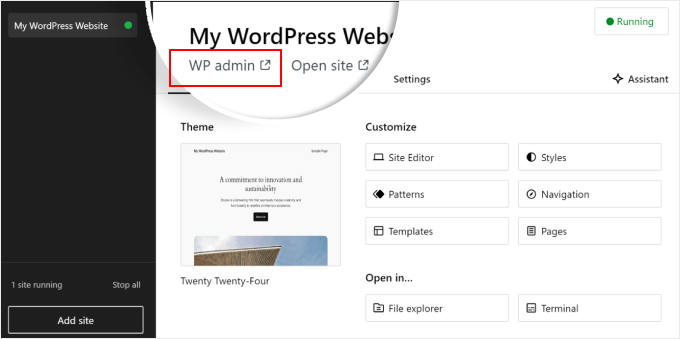
Et c’est à peu près tout pour la configuration. Explorons les autres paramètres qui peuvent s’avérer nécessaires au fur et à mesure que vous construisez votre site local.
Comme vous pouvez le voir dans l’onglet ‘Overview’, vous pouvez immédiatement accéder au menu de l ‘éditeur WordPress full-site directement depuis le tableau de bord de Studio. Vous pouvez également cliquer sur ‘File explorer’ pour ouvrir les dossiers et les fichiers de votre site WordPress et cliquer sur ‘Terminal’ pour gérer votre site à l’aide de WP-CLI.
Si vous passez à l’onglet “Partager”, vous pouvez vous connecter à votre compte WordPress.com, cloner votre site local et le téléverser sur les serveurs de WordPress.com. Cela rendra temporairement le site cloné en ligne, ce qui est utile pour partager des sites de démonstration avec vos clients ou les membres de votre équipe.
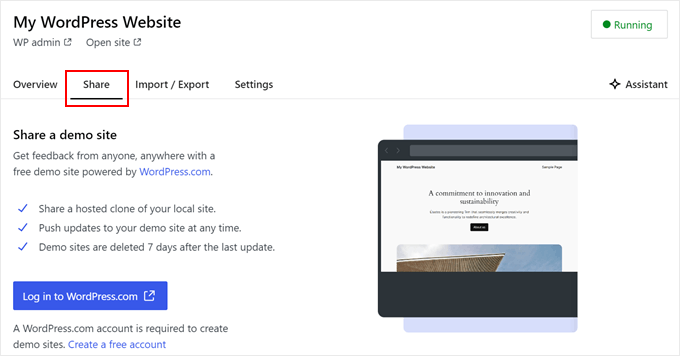
Il peut arriver que vous souhaitiez vous connecter à votre site local directement via votre navigateur au lieu d’utiliser Studio. Dans ce cas, vous devez connaître vos identifiants wp-admin.
Pour les trouver, vous pouvez passer à l’onglet “Réglages” et y trouver votre nom d’utilisateur, votre mot de passe et votre URL de connexion pour l’administration de WordPress.
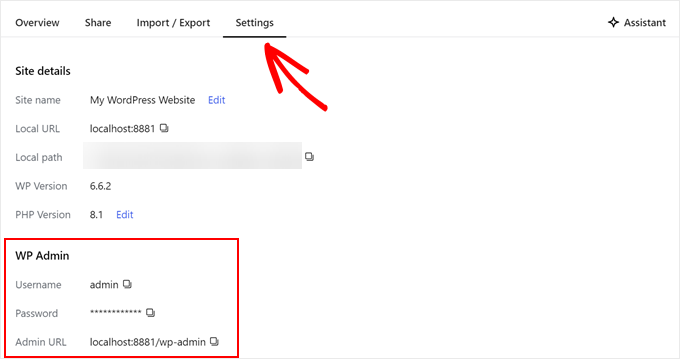
Une autre fonctionnalité intéressante de Studio est son chatbot IA intégré, avec lequel vous pouvez communiquer en cliquant sur le bouton “Assistant”.
Ici, vous pouvez demander de l’aide à Studio pour des tâches telles que la mise à jour de toutes vos extensions en une seule fois, la mise à jour de votre version principale de WordPress ou la création de code pour un bloc personnalisé.
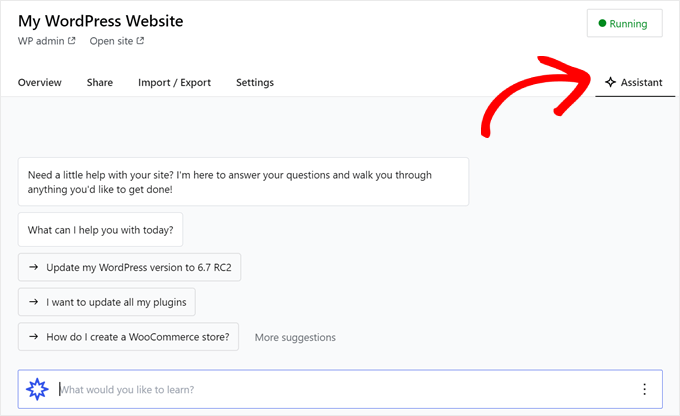
Lorsque vous avez fini de travailler sur votre site local, survolez le bouton “En cours d’exécution” dans le coin supérieur droit jusqu’à ce qu’il indique “Arrêter”.
Cliquez ensuite sur le bouton pour arrêter le site.
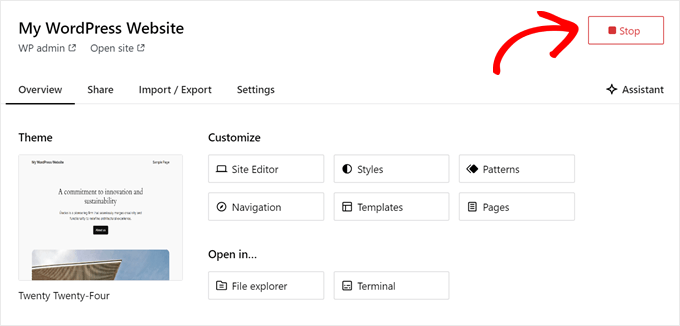
L’inconvénient de Studio est que vous ne pouvez pas configurer l’environnement WordPress à votre guise. Cela signifie que vous devez utiliser la version PHP, le serveur web et la base de données qui ont été présélectionnés pour vous.
Cela peut être un inconvénient si vous devez tester votre site ou votre extension avec des configurations de serveur spécifiques.
Si vous avez besoin de plus de contrôle sur votre environnement WordPress local ou de faire correspondre votre configuration locale avec une configuration de serveur live spécifique, alors vous pouvez consulter la méthode suivante en utilisant Local WP.
Méthode 2 : Installer WordPress sur Windows en utilisant Local WP (plus personnalisable)
Tout d’abord, vous devez télécharger et installer le logiciel Local WP sur votre ordinateur Windows. Il vous suffit de vous rendre sur le site de Local WP et de cliquer sur le bouton “Télécharger gratuitement”.
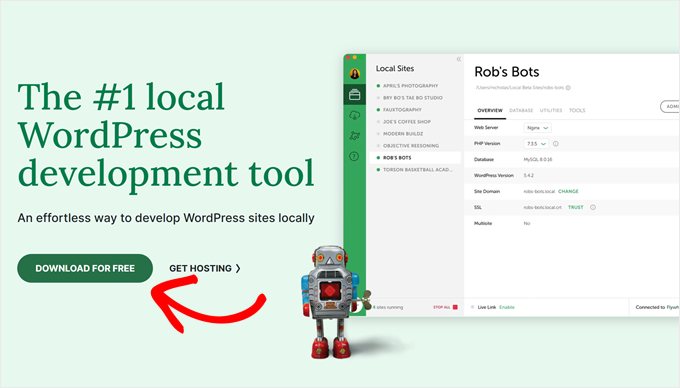
Après cela, une fenêtre popup apparaîtra où vous devrez sélectionner votre plateforme. Choisissez “Windows” dans le menu déroulant.
Ensuite, vous pouvez saisir vos coordonnées telles que vos nom et prénom, votre adresse e-mail professionnelle et votre numéro de téléphone pour télécharger le logiciel.
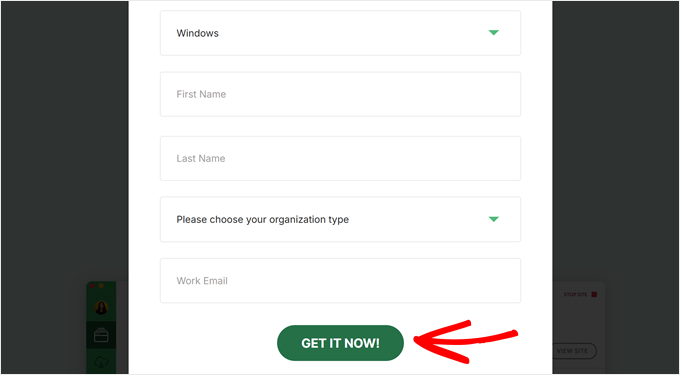
Après avoir saisi/saisie les détails, il suffit de cliquer sur le bouton “Get it Now”.
Ensuite, le logiciel sera automatiquement téléchargé sur votre ordinateur. Sinon, vous pouvez cliquer sur le lien “cliquez ici” pour lancer le téléchargement.
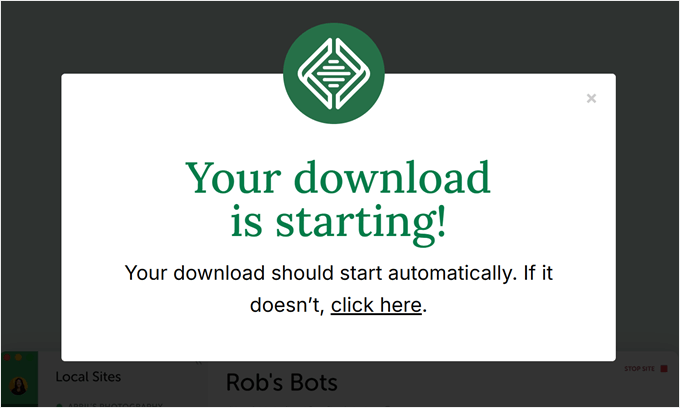
Une fois le fichier téléchargé, lancez l’assistant de configuration.
Vous devez maintenant sélectionner si vous souhaitez installer le logiciel pour tous les utilisateurs ou seulement pour vous.
Une fois que vous avez sélectionné une option, cliquez sur le bouton “Suivant”.
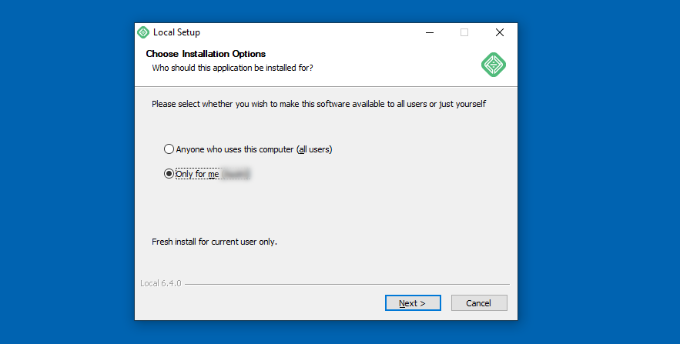
À l’étape suivante, vous pouvez sélectionner le “Dossier de destination” dans lequel le logiciel sera installé.
Il suffit de cliquer sur le bouton “Parcourir” pour définir le chemin d’accès, puis de cliquer sur le bouton “Installer”.
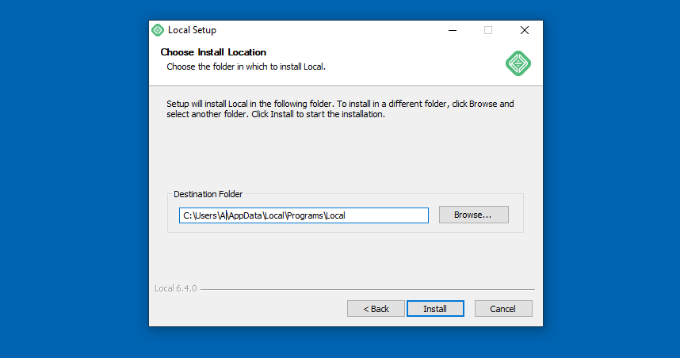
Le logiciel Local WP va maintenant s’installer sur votre ordinateur Windows.
Une fois que c’est fait, vous pouvez cocher la case “Exécuter localement” et cliquer sur le bouton “Terminer” de l’assistant de configuration.
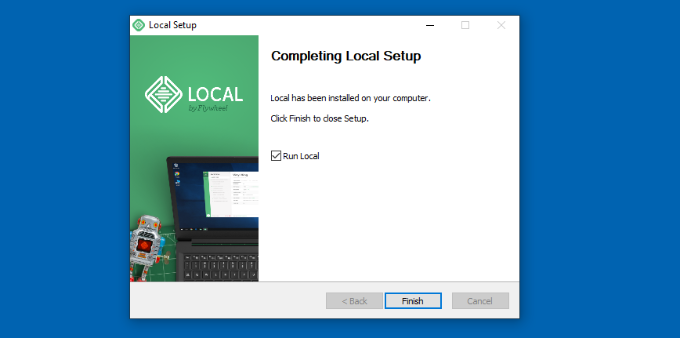
Le logiciel est maintenant lancé sur votre appareil Windows.
L’étape suivante consiste à ajouter un nouveau site local. Pour ce faire, il suffit de cliquer sur le bouton “+” en bas de la page.
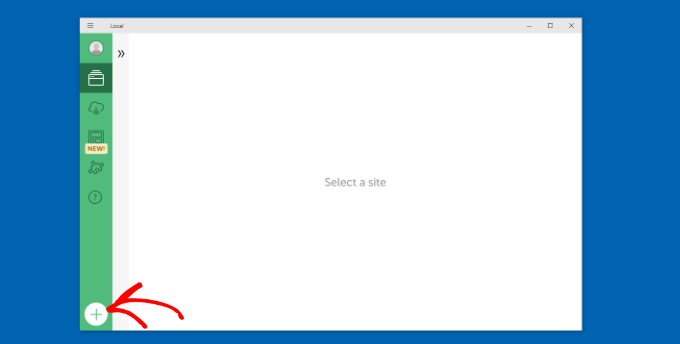
Ensuite, vous pouvez créer un site dans le logiciel local.
Sélectionnez l’option “Créer un nouveau site” et cliquez sur le bouton “Continuer”. Il est également possible de créer le site à partir d’un plan ou d’un fichier de site web existant, mais nous choisirons la première option pour les besoins de la démonstration.
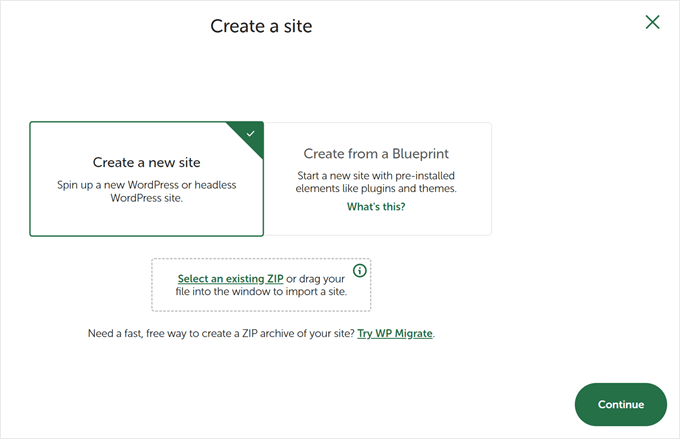
Ensuite, vous pouvez saisir un nom pour votre site local, par exemple “Mon site WordPress”.
Il existe également des options avancées qui vous permettent de saisir le domaine et le chemin d’accès du site local. Par défaut, le domaine utilisera le titre de votre site, mais séparé par des tirets.
Une fois que vous avez terminé, cliquez simplement sur le bouton “Continuer”.
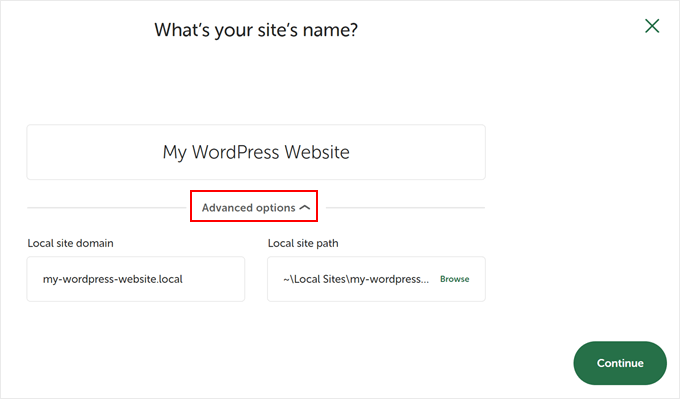
Ensuite, vous devrez choisir un environnement pour votre site local.
Vous pouvez utiliser l’environnement “Préféré” dans lequel le logiciel sélectionnera automatiquement la version PHP, le serveur web et la version MySQL. D’autre part, vous pouvez également sélectionner “Personnalisé” et saisir les détails de l’environnement.
Local WP propose les dernières versions de PHP. En ce qui concerne le serveur web, vous avez le choix entre NGINX et Apache. Vous pouvez également sélectionner MySQL ou MariaDB pour les bases de données.
Notez que certaines versions de PHP, de serveurs web et de bases de données nécessitent le téléchargement de certaines dépendances pour fonctionner correctement.
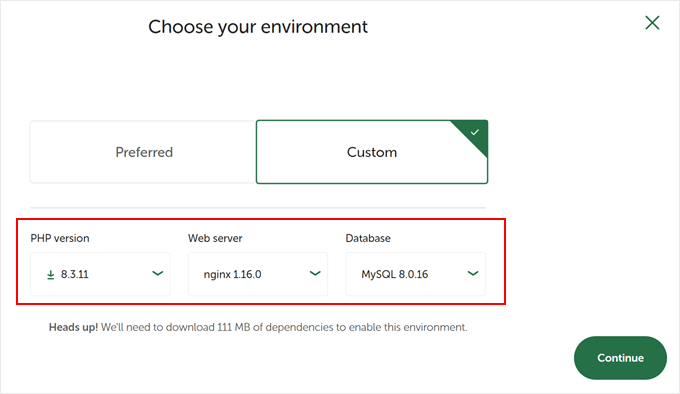
Ensuite, vous pouvez saisir un nom d’utilisateur et un mot de passe WordPress pour votre site local. Il est également possible de choisir une adresse e-mail WordPress à laquelle vous recevrez toutes les notifications par e-mail.
À part cela, il y a une option avancée où le logiciel vous demandera si vous avez un réseau multisite WordPress. Si ce n’est pas le cas, cliquez simplement sur “Non”.
Après avoir saisi/saisie ces informations, il suffit de cliquer sur le bouton “Ajouter un site”.
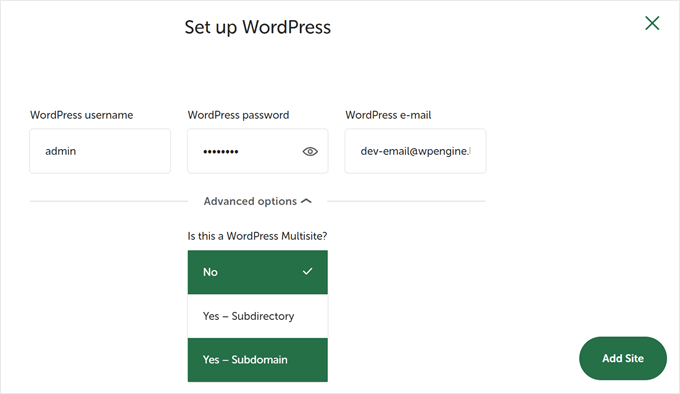
Le logiciel va maintenant installer WordPress et configurer votre site.
Pour lancer le site local, cliquez sur le bouton “Démarrer le site” en haut à droite.
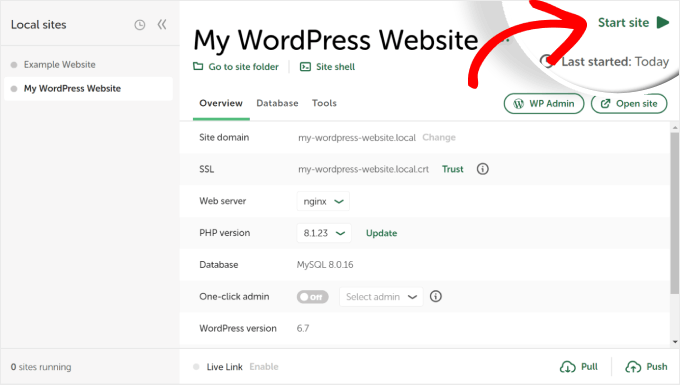
Ensuite, cliquez sur le bouton “WP Admin”, et vous verrez la page de connexion à l’administration de WordPress.
Il suffit de saisir le nom d’utilisateur et le mot de passe que vous avez saisis lors de la configuration du site local, puis de cliquer sur le bouton “Se connecter”.
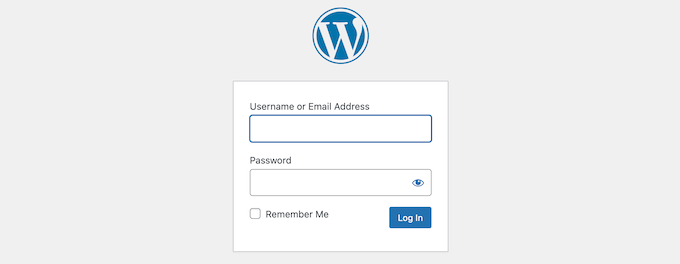
Vous pouvez maintenant modifier votre site local sur votre ordinateur Windows.
Lorsque vous avez terminé, n’oubliez pas d’arrêter le site à partir du logiciel Local WP en cliquant sur le bouton ‘Arrêter le site’.
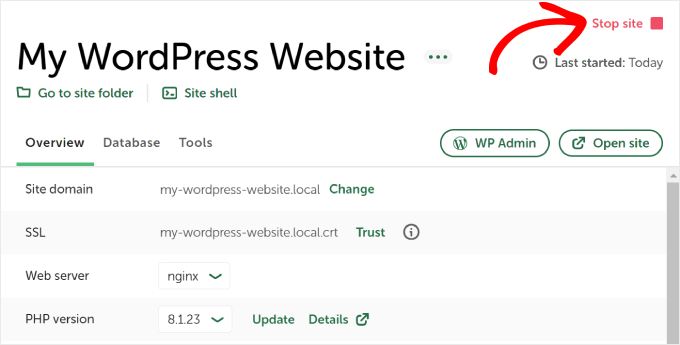
Astuce : Si vous voulez sauter le processus de connexion, vous pouvez activer une connexion d’administration en un clic dans Local WP.
Pour ce faire, il suffit de retourner dans le tableau de bord local de WP et de faire basculer le bouton ” One-click admin ” jusqu’à ce qu’il indique ” On “. Ensuite, dans le menu déroulant, sélectionnez l’utilisateur administrateur qui peut utiliser cette fonctionnalité de connexion en un clic.
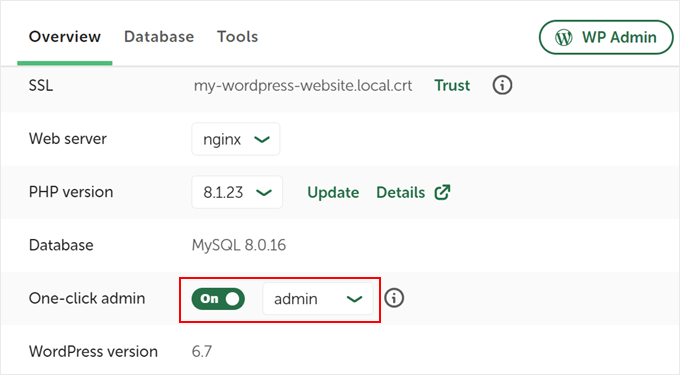
Alternative : Utiliser WordPress Playground pour tester des thèmes, des extensions et plus encore
WordPress Playground est un outil innovant qui vous permet d’expérimenter avec WordPress directement dans votre navigateur web. Il s’agit d’un bac à sable virtuel où vous pouvez essayer de nouveaux thèmes, extensions et fonctionnalités WordPress sans affecter un site réel.
Le terrain de jeu WordPress diffère d’un environnement WordPress local à plusieurs égards.
Tout d’abord, il ne nécessite pas d’installation sur votre ordinateur et se réinitialise après chaque utilisation, contrairement aux installations locales permanentes. Vous pouvez y accéder depuis n’importe quel appareil doté d’un navigateur, alors que les installations locales sont liées à un ordinateur.
Alors que WordPress Playground est idéal pour les tests rapides et l’apprentissage, un environnement WordPress local sur votre ordinateur Windows offre plus de flexibilité pour les projets de développement à long terme.
Pour une description détaillée, consultez notre guide sur l ‘utilisation de WordPress Playground dans votre navigateur.
J’ai installé WordPress sur mon ordinateur Windows, que faire maintenant ?
Maintenant que vous avez installé WordPress sur votre ordinateur, voici ce que vous pouvez faire :
- Apprenez les trucs et astuces de base de WordPress pour mieux utiliser votre site.
- Essayez différents thèmes WordPress pour voir à quoi votre site peut ressembler.
- Installez et testez les extensions WordPress indispensables pour ajouter de nouvelles fonctionnalités à votre site.
- Apprenez à corriger les erreurs courantes de WordPress par vous-même.
- Essayez différents constructeurs de pages par glisser-déposer pour rendre votre site attrayant.
- Découvrez comment réinitialiser le mot de passe administrateur de WordPress sur localhost pour récupérer l’accès à votre site.
- Mettezen place des flux de travail automatisés pour faciliter la gestion de votre site.
- Apprenez à connaître la sécurité de WordPress pour protéger votre site des pirates informatiques.
- Déplacez votre site WordPress local vers un serveur live lorsque vous êtes prêt à le partager avec tout le monde.
Nous espérons que cet article vous a aidé à apprendre comment installer WordPress localement sur un ordinateur Windows. Vous pouvez également consulter notre article sur la façon d’installer WordPress localement sur un ordinateur Mac et notre guide ultime pour créer un site de mise en scène WordPress.
Si vous avez aimé cet article, veuillez alors vous abonner à notre chaîne YouTube pour obtenir des tutoriels vidéo sur WordPress. Vous pouvez également nous trouver sur Twitter et Facebook.





Moinuddin Waheed
This is the best method for anyone who just want to learn and gets hands dirty before actually making a big debut in the WordPress industry.
I have used both the methods local by flywheel and wampserver for local installation of WordPress.
I have also used xampp server for wordpress installation and have experimented with many themes and plugins.
Konrad
Everything went smoothly, no issues with installation, thanks to the simple yet effective guide. Much appreciated!
WPBeginner Support
Glad to hear it worked for you
Admin
saajina
Hi. i am new to WordPress and i am trying to install WampServer. i downloaded WampServer from the link you mentioned above. and i tried to install after download , i choose english language after that i accepted the agreement. after that when i click on the next button to install a pop come by saying this installation can only work if the above vc++ package is installed ……. and please cancel the installation . i don’t know what to do next. please help me
WPBeginner Support
It would depend on which VC++ package is missing but you should be able to go to the Microsoft website and search for the Visual C++ library that WAMP needs to download and install it.
Admin
Jiří Vaněk
Thank you for the guide. Usually, I’ve always tested WordPress, for instance, on services like instawp.com, or I’ve set up everything myself in some virtualization tool on a Linux distribution. This looks quite simple.
WPBeginner Support
Glad you found this a helpful option
Admin
sieutonghop
Is Local WP website data guaranteed?
WPBeginner Support
I don’t think I understand what you’re asking, the files and your content are stored on your computer.
Admin
kiemtienspeed
If using Local WP, where will the website data be saved? Can you explain more clearly?
WPBeginner Support
The data would be stored in the database and the files would be saved in the site’s folder.
Admin
Jiří Vaněk
It’s practically the same as with WordPress on shared hosting. The database can then be exported via PHPMyAdmin, and data via an FTP client (FTP data is stored in a folder locally on the computer). Alternatively, a migration plugin can be used, just like on the server.
Koweh
Hi, please is the a video explainable for the above steps to install Install WordPress on Windows Using WampServer?
WPBeginner Support
Not at the moment but we will consider that for future videos!
Admin
M Sohail
this article is very helpful to me.
Thanks to all Team
WPBeginner Support
Glad to hear our post was helpful!
Admin
Danielle
Hi, very helpful article. How would you do this for an existing WordPress site? (I’m hosting on Hostinger and selected WordPress to construct my site). I already have a domain name and login for WordPress as well.
WPBeginner Support
To move a currently active site to a locally installed WordPress site, you would want to take a look at our guide below!
https://www.wpbeginner.com/wp-tutorials/how-to-move-live-wordpress-site-to-local-server/
Admin
Joseph Lewinski
Fabulous instruction set. I installed WAMP Server simply and without a hitch. There was only one very minor “glitch” in your instructions, which were easy enough to figure out. When the instructions explain the installation of WordPress proper, it says, “Paste the ‘wordpress’ folder into the C:\wamp64\www folder.”, but the IMAGE shows you installing it into the C:\wamp64 folder. Like I said, easy enough to figure out (I used your WORDS, NOT the IMAGE).
THANK YOU for this! I’m subscribing NOW!
WPBeginner Support
Glad our guide was helpful and thank you for pointing that out!
Admin
Duncan Philps-Tate
Hi useful article. The only thing I’m aware of not seeing is anything about when to use Local WP and when to use WAMP. Now I’ve got a choice and I don’t know which is better for me.
Local WP sounds more straightforward and with less to do – but the test doesn’t say whether it also installs Apache, PHP, MySQL (which the WAMP text does say).
On the other hand, WAMP sounds like you have to do more getting it going (just compare the number of paragraphs it needs) but apart from (possibly) adding choice over Apache, PHP, MySQL, what does it give you that Local WP doesn’t?
Hope you can answer this easily.
WPBeginner Support
WAMP has been around longer and was our original recommendation, Local WP was created to make it easier for those just starting out and both will install what is needed to run a WordPress site on your computer.
Admin
Duncan Philps-Tate
Thanks – useful
Seyi
Thanks for this… really helpful
WPBeginner Support
Glad our article was helpful!
Admin
Kylie
I have installed wampserver and have a green light. When I right click I can not find any button called phpadmin. And when I type localhost/phpadmin in my browser I am getting this message.
The requested URL was not found on this server.
Apache/2.4.51 (Win64) PHP/7.4.26 Server at localhost Port 80
WPBeginner Support
You would want to left-click on WAMP’s icon for phpmyadmin, when you go through that route it should show what your URL is set to if it is not properly set under localhost.
Admin
Layla
I’ve done this and started work on one pc but this now needs to go for repair and will be away a while. If I am to install this on a second pc, what files do I need to transfer over so I can continue working on the same website on the other pc? Feeling a bit dumb here that I can’t figure it out myself.
WPBeginner Support
We would recommend following our guide below for transferring your site to a different computer to continue working on it. While the article is for live sites, the method should still work for your local installation.
https://www.wpbeginner.com/wp-tutorials/how-to-move-live-wordpress-site-to-local-server/
Admin
Layla
Thank you so much! That worked perfectly and was so simple!
WPBeginner Support
Glad we could help!
Renata
I installed Wamp Server and C++ Redistributable 2012, 2013 and 2015 but when I try to open it it opens 4 black windows and then it shuts down. What should I do
WPBeginner Support
You would want to check in the bottom right with your hidden icons, WAMP does not have a window pop up by default but would add an icon there for your options with WAMP
Admin
Hosea
Straightforward and to the point guide. Followed it and achieved exactly what I wanted. Great and helpful write-up.
WPBeginner Support
Glad you found our guide helpful
Admin
Ibrahim Yusuff
Thanks for this invaluable guide. The issue of having is with the wamp download. The language is in French and each time i try to change it it goes back to french which i do not understand. i filled all the necessary information but to click on download it changes back to french. pls help me out on this
WPBeginner Support
They currently have a popup that is French when selecting the file to download but at the end of the first paragraph you should see a link to download directly without having to deal with the popup
Admin
prilla kobugabe
hello, i need some help. when i put this localhost/mysite/ in my web browser it responds negatively saying
“The requested URL was not found on this server.
Apache/2.4.41 (Win64) PHP/7.3.12 Server at localhost Port 80”
WPBeginner Support
If you have restarted your computer since installing WAMP you would want to ensure that WAMP is running as that is the most common cause of that specific error.
Admin
Ronnie Ferrer
You are legend guys! Thanks.
Francis Guchie
Thank you so much for this very nice article for beginners
prakoo
api-ms-win-crt-string-l1-1-0.dll is missing from your computer it shows error?
WPBeginner Support
You would want to ensure you install Visual C++ Pro for the most common solution to that error.
Admin
Melissa
Hi – I have WAMP installed locally on my Windows 10 machine running PHP version: 7.3.12. I want to upgrade to PHP 7.4 – do I need to reinstall WAMP or can I update PHP separately?
WPBeginner Support
You would want to click on the WAMP icon, and check under PHP, Version and depending on when you installed WAMP there should be the option to change versions by clicking on the version you want to use.
Admin
melissa
thanks – this was perfect advice!
Holly
Thanks for this article! It is the best and most straight-forward one I’ve come across, it’s very helpful and detailed. Keep up the great work! As a beginner, I really appreciate it.
WPBeginner Support
Glad you found our guide helpful
Admin
Jules Ivan
This is awesome! Thank you for making this article!
WPBeginner Support
Glad you found our guide helpful
Admin
Ben
While installing, I got a System error that says ”The code execution cannot proceed because MSVCR120.dll was not found. Reinstalling the program may fix this problem'”
How can I get this done please
WPBeginner Support
You need to install Visual C++ Redistributable that we link to in the article
Admin
Diya
I have installed wordpress in wamp and completed my first website. I have got another project now. So for the second website how should I start?Should I install wordpress again in a second “mysite2” folder?
WPBeginner Support
You can certainly do that for the most common method for creating a new site.
Admin
saheed
im receiving myssqld.exe- system error. how do i fix it
WPBeginner Support
You would want to ensure you installed Visual C++ Redistributable
Admin
Tom Bauer
WAMP64 will not install on a win7 64 machine.
WPBeginner Support
Unless we hear otherwise, you can install it on Windows 7 still, depending on the error you are running into, you may need to reach out to WAMP’s support.
Admin
Paul
Great instructions, thanks.
Everything installed fine, just have a problem this morning in trying to log into the browser. Every setting I have tried hasn’t worked.
I know I am being thick but could you confirm what I should be typing in the browser to access the program.
Thanks
WPBeginner Support
As we state in the article, it should be something similar to localhost/mysite. You would also want to ensure WAMP is running for the most common reason for that issue.
Admin
Peter
I was having similar issue as others. All went well until I got to the point with Apache not running. The issue was with Port 80 it was used by something else (not skype) so I went to Tools > Use other port than 80 I added the port 8080. Then it all worked however then when you want to access your website you can’t use localhost/mysite/ but localhost:8080/mysite/ since you changed the default port.
I didn’t find this in the comments. Maybe it will help someone.
WPBeginner Support
Thanks for sharing what helped you with this issue
Admin
Bas
Hi, thanks for the tutorial. I completed it, and it works like a charm. But now my question is: how do I get my “real” live website data in the local test environment? Is there some way to export that and import it into the local test environment?
WPBeginner Support
For that, you would want to take a look at our article below:
https://www.wpbeginner.com/wp-tutorials/how-to-move-live-wordpress-site-to-local-server/
Admin
Mahima Pandey
here i have downloaded the wordpress file and done everything according to the given instruction . but lastly stuck in the localhost address bar
localhost/servername in the internet explore has to be typed to get to wordpress. but what to be type for google ,firefox. pls lhelp me with this its really urgent.
WPBeginner Support
You should be able to type that same address on any internet browser to see the site on your local computer. If you wanted to have your site found online, you would want to look into a domain and hosting provider.
Admin
Konstantinos Paturas
Thank you so much.
WPBeginner Support
You’re welcome
Admin
Armel
Thanks for this useful article. I successfully installed WordPress using Wamp. But, I get this message. “Installation failed: there has been a critical error on your website. Please check your site admin email inbox for instructions. Learn more about debugging in WordPress.”
Please, how can i fix it ?
WPBeginner Support
For that error, you would want to take a look at our article below:
https://www.wpbeginner.com/wp-tutorials/how-to-fix-the-wordpress-white-screen-of-death/
Admin
Hoat Le
Dear WPBeginner Support;
I read your tut very carefully, and didn’t see you mention about VirtualHost in WampServer, so I don’t know if I have to create a Virtual Host for my test site.
WPBeginner Support
It can make URLs closer to what you would expect from a site but it is not a requirement and can be difficult for beginners to set up.
Admin
Shani
Hello,
Thank you so much for this article!
You’ve really helped me!
I’m interested to know now how to login to my site when I go on wordpress.
WPBeginner Support
If you can navigate to your WordPress site then you would add /wp-admin to the end, we cover a few more options in our article below that you can also try:
https://www.wpbeginner.com/beginners-guide/how-to-find-your-wordpress-login-url/
Admin
mimi
I followed the process accordingly but when i click on the green WAMP icon in order to create a blank MySQL database nothing pops up
WPBeginner Support
The most common reason for that would be if you didn’t install the C++ redistributable if you have not done that.
Admin
Aminat
Thanks a lot, really helpful
WPBeginner Support
You’re welcome
Admin
Dav
Hi,
I have installed as per instructions but I am getting an error trying to log into
ERROR: Failed to set session cookie. Maybe you are using HTTP instead of HTTPS to access phpMyAdmin.
What am I doing wrong?
WPBeginner Support
That is likely a hiccup with either your browser cache or a browser addon, we would recommend clearing your cache or trying to use an incognito browser to see if that helps resolve the issue.
Admin
Dav
Thanks, that works
Nathan Zindikilani
Hi, thank you for the article. when i try to open my local host site i get the following error; There has been a critical error on your website.this is after pasting ‘wordpress’ to www folder. how may i solve this
WPBeginner Support
You would want to ensure the file is unzipped, if it is you may want to try reading a fresh WordPress download to the folder to see if there was a hiccup with your download.
Admin
Spyros
Hi, i need your help please, i follow all the steps in your detailed article but i saw a message “can’t select database We were able to connect to the database server (which means your username and password is okay) but not able to select the test_db database and some other that i believe you know”.
Thanks in advance!
WPBeginner Support
You may want to ensure there are no typos in the database name you set, it looks like it is not able to find a database with the name given.
Admin
Raheel
I am getting “Error establishing a database connection”
Any help here please
WPBeginner Support
For common solutions to that error, you would want to take a look at our article below:
https://www.wpbeginner.com/wp-tutorials/how-to-fix-the-error-establishing-a-database-connection-in-wordpress/
Admin
Steve
Hi,
I have installed WAMP and created a WordPress site on my computer – thanks for your excellent guide. I used “mysite” as in your example to stay consistent with you as I built my software kingdom. Now that things are looking good, is it possible to simply rename the “mysite” folder (which is inside “www” to my preferred name, or is it more complicated than that? I’m trying to avoid starting over. Thanks
WPBeginner Support
We would recommend staying with the format you’ve set up already if possible and once you have hosting ready we would recommend taking a look at our guide below:
https://www.wpbeginner.com/wp-tutorials/how-to-move-wordpress-from-local-server-to-live-site/
Admin
Francesco
Hi,
Can I use this system to test a previous back up I did via the server control panel?
I have a zip file which is a mirror of my directory on the server, including database and WP-admin file.
I would line to test if the backup I have works fine and possible run it on a precioys version of the WP
WPBeginner Support
You would want to check with the tool you are using for the specifics but it should allow you to do what you’re wanting.
Admin
Melissa T
Installed WAMP and WordPress – thanks for the wonderfully detailed instructions! So now it’s time to create the web site — is there a guide on wpbeginner for that?
thank you!
WPBeginner Support
There are many different types of sites so there is no complete guide but for a starting point you may want to take a look at our article below. Step 3 and beyond in the guide should help.
https://www.wpbeginner.com/guides/
Admin
kwestyon
First, thank you so much for the guide! It’s working. Second, is there a way wherein after you create the website, would there a way to view the site after you clicked the published button. Sorry for the dumb question.
WPBeginner Support
If you are logged in, in the top right you should be able to open the dropdown that has your site title, and there you should find a link to view your site.
Admin
Yomi
Hello,
If I install WordPress on a localhost based on the content of this blog, will I be able to use plugins like woocommerce, elementor, astra & kadence?
Thank you.
WPBeginner Support
Yes, installing locally you would be able to use plugins and page builders like those on your site
Admin
Lisa
Hi,
I am at the point where I would put localhost/mysite/ in the browser. I am getting the “404 not found error”.
I named the copy of wordpress to wamp the same and have double checked the address to see if it’s typed in correctly. This still happens, what am I doing wrong?
Thanks!
WPBeginner Support
You would want to ensure you’re not running into the Skype error where it is trying to use port 80 while WAMP is.
Admin
WPBeginner Support
Currently, the WAMP website is down which is why we’ve added a different link and included a note above and are working on updating this article as quickly as we are able
Admin
mark
WAMP link redirects to a different site.